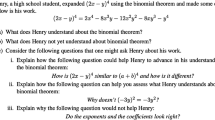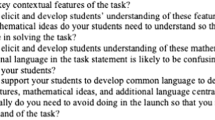Abstract
Most prospective secondary mathematics teachers complete a course in real analysis, yet view the content as unrelated to their future teaching. We leveraged a theoretically motivated instructional model to design modules for a real analysis course that could inform secondary teachers’ pedagogy, focusing on how this model was implemented in a single module about “attending to scope.” The central aim is to document how teachers’ experience in this real analysis course influenced their subsequent teaching. In the majority of lessons we observed from six participating teachers, the following occurred: (i) the teacher explicitly attended to the scope of statements discussed in class; and (ii) in post-class interviews, the teacher highlighted their deliberate attention to scope and attributed this behavior to their experience in the experimental real analysis course. We discuss the design approach, its relation to teachers’ actions in the classroom, and potential implications for teacher education in advanced content courses.








Similar content being viewed by others
Change history
03 August 2019
The authors would like to include the following changes in the published article.
References
Ball, D. L., & Bass, H. (2009). With an eye on the mathematical horizon: Knowing mathematics for teaching to learners’ mathematical futures. Paper presented at the 43rd Jahrestagung der Gesellschaft fur Didaktik der Mathematik.
Ball, D. L., Thames, M. H., & Phelps, G. (2008). Content knowledge for teaching: What makes it special? Journal of Teacher Education, 59(5), 389–407.
Barnett, S. M., & Ceci, S. J. (2002). When and where do we apply what we learn?: A taxonomy for far transfer. Psychological Bulletin, 128(4), 612.
Begle, E. (1972). Teacher knowledge and pupil achievement in algebra (NLSMA Technical Report Number 9). Palo Alto, CA: Stanford University, School Mathematics Study Group.
Brown, C., & Borko, H. (1992). Becoming a mathematics teacher. In D. A. Grouws (Ed.), Handbook of Research on Mathematics Teaching and Learning (pp. 209–239). New York: Macmillan.
Common Core State Standards in Mathematics (CCSSM). (2010). Retrieved from: http://www.corestandards.org/the-standards/mathematics.
Conference Board of Mathematical Sciences (CBMS). (2001). The mathematical education of teachers. Providence, RI and Washington, DC: American Mathematical Society and Mathematical Association of America.
Conference Board of Mathematical Sciences (CBMS). (2012). The mathematical education of teachers II. Providence, RI and Washington, DC: American Mathematical Society and Mathematical Association of America.
Cuoco, A., Goldenberg, E. P., & Mark, J. (1996). Habits of mind: An organizing principle for mathematics curricula. Journal of Mathematical Behavior, 15(4), 375–402.
Dreher, A., Lindmeier, A., Heinze, A., & Niemand, C. (2018). What kind of content knowledge do secondary mathematics teachers need? Journal für Mathematik-Didaktik. https://doi.org/10.1007/s13138-018-0127-2.
Dubinsky, E., Dautermann, J., Leron, U., & Zazkis, R. (1994). On learning fundamental concepts of group theory. Educational Studies in Mathematics, 27(3), 267–305.
Even, R. (2011). The relevance of advanced mathematics studies to expertise in secondary school mathematics teaching: Practitioner’s views. ZDM Mathematics Education, 43, 941–950.
Fitzpatrick, P. M. (2006). Advanced Calculus (2nd ed.). Providence, RI: American Mathematical Society.
Fukawa-Connelly, T. (2012). A case study of one instructor’s lecture-based teaching of proof in abstract algebra: Making sense of her pedagogical moves. Educational Studies in Mathematics, 81(3), 325–345.
Fukawa-Connelly, T., Weber, K., & Mejia-Ramos, J. P. (2017). Informal content and student note-taking in advanced mathematics classes. Journal for Research in Mathematics Education, 48(5), 567–579.
Goulding, M., Hatch, G., & Rodd, M. (2003). Undergraduate mathematics experience: Its significance in secondary mathematics teacher preparation. Journal of Mathematics Teacher Education, 6, 361–393.
Heid, M. K., & Wilson, P. S. (Eds.). (2015). Mathematical understanding for secondary teaching: A framework and classroom-based situations. Charlotte, NC: IAP.
Jakobsen, A., Thames, M. H., & Ribeiro, C. M. (2013). Delineating issues related to horizon content knowledge for mathematics teaching. Paper presented at the 8th annual Congress of European Research in Mathematics Education (CERME-8), Working group 17 (From a study of teaching practices to issues in teacher education). Antalya, Turkey.
Klein, F. (1932). Elementary mathematics from an advanced standpoint: Arithmetic, algebra, analysis (E. R. Hendrick & C. A. Noble, Trans.). Mineola, NY: Macmillan.
Krupnik, V., Fukawa-Connelly, T., & Weber, K. (2018). Students’ epistemological frames and their interpretation of lectures in advanced mathematics. Journal of Mathematical Behavior, 49(1), 174–183.
Leinhardt, G., Zaslavsky, O., & Stein, M. K. (1990). Functions, graphs, and graphing: Tasks, learning, and teaching. Review of Educational Research, 60(1), 1–64.
Lew, K., Fukawa-Connelly, T., Mejia-Ramos, J. P., & Weber, K. (2016). Lectures in advanced mathematics: Why students might not understand what the mathematics professor is trying to convey. Journal for Research in Mathematics Education, 47(2), 162–198.
Lobato, J. (2012). The actor-oriented transfer perspective and its contributions to educational research and practice. Educational Psychologist, 47, 232–247.
Monk, D. H. (1994). Subject area preparation of secondary mathematics and science teachers and student achievement. Economics of Education Review, 13(2), 125–145.
Moreira, P. C., & David, M. M. (2008). Academic mathematics and mathematical knowledge needed in school teaching practice: Some conflicting elements. Journal of Mathematics Teacher Education, 11(1), 23–40.
National Council of Teachers of Mathematics (NCTM). (2000). Principles and standards for school mathematics. Reston, VA: Author.
Rowland, T., Huckstep, P., & Thwaites, A. (2005). Elementary teachers’ mathematics subject knowledge: The knowledge quartet and the case of Naomi. Journal of Mathematics Teacher Education, 8(3), 255–281.
Schwab, J. J. (1978). Science, curriculum and liberal education. Chicago, IL: University of Chicago Press.
Shulman, L. (1986). Those who understand: Knowledge growth in teaching. Educational Researcher, 15(2), 4–14.
Speer, N., King, K., & Howell, H. (2015). Definitions of mathematical knowledge for teaching: Using these constructs in research on secondary and college mathematics teacher. Journal of Mathematics Teacher Education, 18(2), 105–122.
Tall, D. (Ed.). (1991). Advanced mathematical thinking. Dordrecht: Springer.
Tall, D. (1992). The transition to advanced mathematical thinking: Functions, limits, infinity and proof. In D. A. Grouws (Ed.), Handbook of Research on Mathematics Teaching and Learning (pp. 495–511). Reston, VA: NCTM.
Tatto, M. T., Lerman, S., & Novotna, J. (2010). The organization of the mathematics preparation and development of teachers: A report of the ICMI Study 15. Journal of Mathematics Teacher Education, 13(4), 313–324.
TeachingWorks (2018). High leverage teaching practices. Downloaded from: http://www.teachingworks.org/work-of-teaching/high-leverage-practices. Last downloaded May 31, 2018.
Usiskin, Z., Peressini, A., Marchisotto, E. A., & Stanley, D. (2003). Mathematics for high school teachers: An advanced perspective. Upper Saddle River, NJ: Pearson.
Vig, R., Murray, E., & Star, J. R. (2014). Model breaking points conceptualized. Educational Psychology Review, 26(1), 73–90.
Wasserman, N. (2016). Abstract algebra for algebra teaching: Influencing school mathematics instruction. Canadian Journal of Science, Mathematics and Technology Education, 16(1), 28–47.
Wasserman, N. (2017). Making sense of abstract algebra: Exploring secondary teachers’ understanding of inverse functions in relation to its group structure. Mathematical Thinking and Learning, 19(3), 181–201.
Wasserman, N. (2018). Knowledge of nonlocal mathematics for teaching. Journal of Mathematical Behavior, 49(1), 116–128.
Wasserman, N., Fukawa-Connelly, T., Villanueva, M., Mejia-Ramos, J. P., & Weber, K. (2017a). Making real analysis relevant to secondary teachers: Building up from and stepping down to practice. PRIMUS, 27(6), 559–578.
Wasserman, N., & Stockton, J. (2013). Horizon content knowledge in the work of teaching: A focus on planning. For the Learning of Mathematics, 33(3), 20–22.
Wasserman, N., Weber, K., & McGuffey, W. (2017b). Leveraging real analysis to foster pedagogical practices. In A. Weinberg, C. Rasmussen, J. Rabin, M. Wawro, & S. Brown (Eds.), Proceedings of the 20th annual conference on research in undergraduate mathematics education (RUME) (pp. 1–15). San Diego, CA: RUME.
Wasserman, N., Weber, K., Villanueva, M., & Mejia-Ramos, J. P. (2018). Mathematics teachers’ views about the limited utility of real analysis: A transport model hypothesis. Journal of Mathematical Behavior, 50(1), 74–89.
Zazkis, R., & Leikin, R. (2010). Advanced mathematical knowledge in teaching practice: Perceptions of secondary mathematics teachers. Mathematical Thinking and Learning, 12, 263–281.
Acknowledgements
This material is based upon work supported by the National Science Foundation under collaborative Grants DUE 1524739, DUE 1524681 and DUE 1524619. Any opinions, findings, or recommendations expressed in this material are those of the authors and do not necessarily reflect the views of the National Science Foundation.
Author information
Authors and Affiliations
Corresponding author
Additional information
Publisher's Note
Springer Nature remains neutral with regard to jurisdictional claims in published maps and institutional affiliations.
Rights and permissions
About this article
Cite this article
Wasserman, N.H., Weber, K., Fukawa-Connelly, T. et al. Designing advanced mathematics courses to influence secondary teaching: fostering mathematics teachers’ “attention to scope”. J Math Teacher Educ 22, 379–406 (2019). https://doi.org/10.1007/s10857-019-09431-6
Published:
Issue Date:
DOI: https://doi.org/10.1007/s10857-019-09431-6




